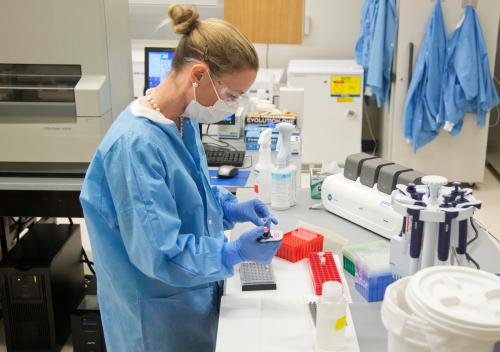Private sector funding of drugs and vaccines designed to help people in the developing world lags what is needed to deal with illnesses such as HIV/AIDs, tuberculosis, and malaria. There has been considerable progress in fighting these diseases, but more effort is needed since only around $6.3 billion is devoted to diseases prevalent in low and middle-income countries (LMICs).
For that reason, the Brookings Private Sector Global Health R&D Project has emphasized ways to strengthen private investment in global health R&D. Maximizing the impact of global health R&D will require a sustained effort on the part of the private as well as the public and charitable sectors.
In this report—the third published by the Project—authors Leigh Anderson, Carol Levin, and Travis Reynolds undertake a detailed literature review of the factors limiting private sector investment in global health R&D. They find that the greatest barriers to private investment include policy and regulatory obstacles, limited revenues, market uncertainty, high fixed costs on the part of businesses, and stronger possibilities for making money downstream in the treatment process relative to upstream R&D. They reach these conclusions after studying 285 research papers drawn from academia, pharmaceutical company websites, philanthropic analyses, and evaluations undertaken by non-governmental organizations.
In an effort to deal with these obstacles, a number of organizations have proposed policies designed to increase private investment in drugs and vaccines. Based on the authors’ analysis of research by global health experts, they find eight key results:
- Greater public research funding “helped advance private sector R&D”
- Advance market commitments “have the potential to incentivize investment” and “reduce uncertainty for donors and suppliers”
- Orphan drug programs administered by the U.S. Food and Drug Administration and the European Union “have increased health R&D funding”
- “A priority reviewer voucher has had a positive impact on private sector health R&D spending”
- There are “mixed opinions” regarding tax credits for private sector R&D investment
- Wild-card patent extensions are costly and it is not clear they are beneficial to overall investment
- “Proprietary scientific information plays a generally positive role in creating incentives for private sector global health R&D”
- “Proprietary market information—especially moving forward with enormous data repositories and especially for LMICs—may create more downstream rents”
Based on these findings, the authors’ recommend that leaders “focus on information access”. In particular, they say it is time to “consider alternative mechanisms to patents (that are time limited, have distorting incentives, and are unevenly enforced in LMICs)” and that new approaches are needed to reward “scientific innovation and knowledge, and undertake efforts to make market information fully public”. Having limited market data makes it harder to evaluate risk and reduce uncertainty among private investors. Therefore, it is imperative that investors have greater transparency in business data and rates of return on market investments.
For more information on the paper by Anderson, Levin, and Reynolds, see the technical report “Review of Literature on Factors Affecting Private Sector Investment in Global Health R&D”.







Commentary
Factors limiting private sector investment in global health R&D
December 4, 2017